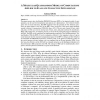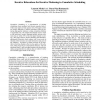165 search results - page 24 / 33 » Why Machine Ethics |
CGO
2003
IEEE
15 years 7 months ago
2003
IEEE
Modern processors perform dynamic scheduling to achieve better utilization of execution resources. A schedule created at run-time is often better than one created at compile-time ...
146
Voted
KBSE
2000
IEEE
15 years 7 months ago
2000
IEEE
The majority of work carried out in the formal methods community throughout the last three decades has (for good reasons) been devoted to special languages designed to make it eas...
139
Voted
IPPS
1998
IEEE
15 years 6 months ago
1998
IEEE
The paper presents how the Random PROLOG Processor (RPP), a bio-inspired model of computations, can be used for formalization and analysis of a phenomenon - the Collective Intelli...
123
click to vote
INCDM
2010
Springer
15 years 6 months ago
2010
Springer
Abstract. Character design is a key ingredient to the success of any comicbook, graphic novel, or animated feature. Artists typically use shape, size and proportion as the first de...
119
Voted
AIPS
2004
15 years 4 months ago
2004
Cumulative scheduling is a generalization of jobshop scheduling, where machines have discrete capacities and activities may require several capacity units. This paper considers it...



